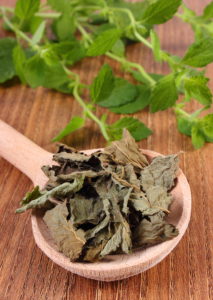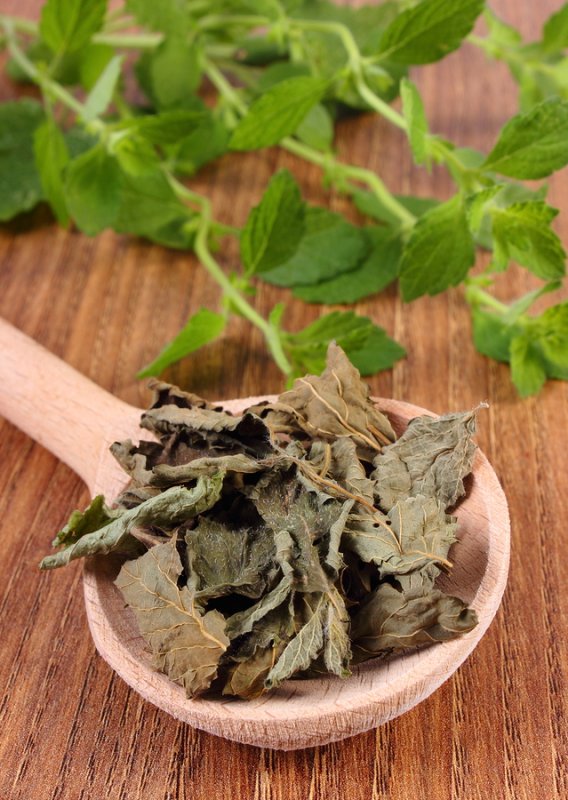Table of Contents
Lemon Balm (Melissa officinalis) is native to the Mediterranean region. And has been cultivated for well over 2,000 years. Melissa officinalis (Melissa is derived from the Greek for ‘honey bee’) was observed by Pliny the Elder as great for attracting bees.
Lemon balm’s appeal continued to grow. It was used as a tea to combat mental confusion, and as an elixir to extend lifespan. In the 17th century, French Carmelite nuns dispensed Carmelite Water. This lemon-balm infused ‘miracle water’ was said to improve memory, vision, and reduce fever, melancholy and congestion.
Melissa tea is used in France today to treat fatigue and headaches. Naturopaths recommend lemon balm to treat cold and flu, lower blood pressure, for insomnia and indigestion.

As a nootropic, lemon balm is used primarily to lower anxiety and boost memory.
Lemon Balm helps:
- Neurotransmitters. Lemon Balm affects brain levels of acetylcholine (ACh). It plays an inhibitory effect on acetylcholinesterase (AChE). AChE is an enzyme that breaks down ACh. Improving memory and cognition.
- Neuroprotectant. Lemon Balm is a potent antioxidant that protects your brain cells from free radical damage.
- Anxiety and stress. Lemon Balm has a significant anxiolytic (anti-anxiety) effect. It raises brain levels of the neurotransmitter GABA by inhibiting the enzyme GABA transaminase. This has an effect on mood regulation.
Overview
Lemon Balm (Melissa officinalis) is an herb that’s native to the Mediterranean region. And now found in gardens throughout Europe and North America.

Lemon balm has a long history as a treatment for stress, anxiety, thyroid issues, indigestion, infections, viruses and inflammation.
Related to the mint family of herbs, lemon balm has a subtle lemon scent. And its small white flowers attract bees. Hence the botanical name ‘Melissa’, which is Greek for honey bee.
The first recorded medical use of lemon balm dates back to Dioscorides, the ancient Greek physician, who used the herb for its anti-bacterial and soothing properties. The famous Swiss Renaissance physician, Paracelsus, called it the “elixir of life”.
In the 16th century, English botanist John Gerard, gave it to his students to “quicken the senses”. This appears to be the first recorded use of the herb for brain and cognitive health.
The most recent research shows lemon balm has remarkable healing and regenerative effects on your brain. It stimulates memory, and supports the health of your brain’s white matter.
Lemon balm’s two primary compounds that affect brain health are eugenol and rosmarinic acid.[i]
Eugenol is an antioxidant 5-times more potent than alpha-tocopherol found in Vitamin E. So lemon balm acts to boost your body’s natural healing processes by eliminating free radicals that damage brain cells.
And lemon balm helps increase levels of your body’s most powerful built-in antioxidants, dismutase and glutathione peroxidase.[ii]
Rosmarinic acid promotes an anti-depressant effect in your brain by downregulating mitogen-activated protein kinase phosphatase-1 (Mkp-1). And it upregulates brain-derived neurotrophic factor (BDNF), along with boosting dopamine synthesis.[iii]
How does Lemon Balm work in the Brain?
Lemon Balm boosts brain health and function in several ways. But two in particular stand out.
- Lemon Balm boosts memory. Lemon balm increases the activity of the neurotransmitter acetylcholine (ACh) in your brain. When your brain sends signals, it uses acetylcholine to keep the signals moving. But once used, your brain removes acetylcholine with an enzyme called acetylcholinesterase (AChE).[iv]
But if you have too much AChE, as is the case with Alzheimer’s patients, it restricts brain signaling. One way to prevent this signal failure is to prevent the breakdown of acetylcholine.
The compound rosmarinic acid in lemon balm encourages blood flow, which helps to keep brain cells from dying.[v] And it inhibits the formation of AChE.
The result is that your brain is stimulated, memories continue to form, and brain fog is eliminated.
- Lemon Balm reduces stress. One-way lemon balm does this is to promote GABA, a glutamate inhibitor in your brain. Glutamate excites brain cells to act. While this excitation is necessary, too much glutamate results in cell death.
Lemon balm promotes a better balance in glutamate levels, and helps new cell growth.[vi] The result is a boost in memory and reduction in stress. Largely due to eugenol, one of the components of lemon balm.
How things go bad
Chronic stress, anxiety, poor blood flow and free radicals (oxidation) can damage your brain. And one of the ways this manifests is memory loss.
It comes as no surprise that people with memory loss experience higher rates of anxiety and depression. As verified in one Australian research study.[vii]
↓ Chronic stress reduces memory capacity
↓ Toxins kill brain cells from the inside
↓ Free radicals destroy neurons and synapses
↓ Acetylcholine (ACh) levels decline
↓ Brain-derived neurotrophic factor (BDNF) declines
Under conditions of chronic stress your brain loses the capacity to transmit signals between neurons efficiently. Memory, cognition, and decision-making all suffer as a result.
Lemon Balm benefits
Lemon Balm undoes damage to the brain caused by chronic stress and oxidative damage. It boosts GABA levels and keeps toxic glutamate overload in check.
Lemon balm inhibits the enzyme AChE that breaks down acetylcholine (ACh) levels in your brain. Boosting ACh improves memory, recall and cognition.
Rosmarinic acid in lemon balm works as an antidepressant. And boosts brain-derived neurotrophic factor (BDNF) which promotes the growth, maturation and maintenance of brain cells.
And the eugenol in lemon balm is a very powerful antioxidant. Eliminating oxidative damage in brain cells by neutralizing free radicals. And boosting your brain’s own antioxidants to provide even more protection.
How does Lemon Balm feel?
The effects of supplementing with Lemon Balm (Melissa officinalis) can provide an anti-anxiety effect within minutes of taking it. Some users say it works as well as popping a Xanax®.
You should experience an increase in focus along with a sense of calm. And even though lemon balm works well as a sleep aid, taking it during the day shouldn’t make you drowsy.
Users report lemon balm effective in taming racing thoughts that come with Obsessive Compulsive Disorder (OCD). Some even use lemon balm as an effective way to control irritable bowel syndrome (IBS).
Lemon Balm Clinical Research
Research continues in medicinal plants and herbs that have been used for millennia to treat cognition and memory problems. One study conducted at the University of Newcastle upon Tyne in the UK, found Melissa officinalis to be one of the strongest in effects on acetylcholine receptors. And being an effective aid for memory.[viii]
Lemon Balm as a Nootropic
Lemon Balm has been shown to improve problem-solving and memory in both human and animal models. And age seems to make no difference. All groups using lemon balm showed boosts in recall and problem-solving.
Some recent studies with Alzheimer’s patients have shown improvement when using lemon balm. In one study done in China, researchers gave Sprague Dawley rats eugenol.
One of the active compounds found in lemon balm, eugenol is a potent antioxidant. In this case it helped test subjects get their memory back.[ix]
Another study noted that lemon balm inhibits acetylcholinesterase (AChE). This enzyme breaks down the critical neurotransmitter acetylcholine (ACh). ACh is crucial to creating memories and cognition. Lemon balm was shown to boost and support mood and memory.[x]
Lemon Balm for Stress Reduction
A double-blind, placebo-controlled experiment was conducted in the UK with 18 healthy volunteers. The subjects received two separate single doses of standardized lemon balm extract (300 mg and 600 mg), or a placebo, on separate days. Followed by a 7-day washout period.
Mood was assessed before dosing, and 1-hour after dosing with lemon balm extract. The study subjects did a 20-minute version of the Defined Intensity Stressor Simulation (DISS) battery of tests.
The results showed that a 600 mg dose of lemon balm eliminated the negative mood effects of doing the DISS tests. They reported an increase in calmness and they were more alert.
The researchers also reported a significant increase in mathematical processing, with no reduction in accuracy. This was after taking the lower 300 mg dose.
The nootropic benefits of lemon balm, according to this test, was a boost in cognition, and had a calming effect.[xi]
Lemon Balm Recommended Dosage
Lemon balm has a long history of use in treating a host of ailments. Including memory and cognition, gas, bloating, earache, vomiting, headache, toothache and insomnia.
 For nootropic use, Melissa officinalis (lemon balm) comes in tea and capsule form. For the most potent dosage find lemon balm extract capsules.
For nootropic use, Melissa officinalis (lemon balm) comes in tea and capsule form. For the most potent dosage find lemon balm extract capsules.
The suggested dose by most naturopaths and alternative health doctors is 300 mg of lemon balm extract 2-3 times per day.
Dosage of lemon balm leaf as a tea is 1 – 2 grams per cup of tea.
You can use lemon balm in the morning to address daytime anxiety. And towards evening to support relaxation and sleep.
Lemon Balm Side Effects
Lemon balm is considered non-toxic and very safe for most users. Most neurohackers won’t experience any side effects.
Note: Lemon balm may have an “antithyrotropic effect“. So if you’re hypothyroid, and on thyroid medication, you may want to avoid using lemon balm.
And use caution when combining lemon balm with; anti-anxiety meds, anti-histamines, muscle relaxers, anti-seizure drugs or tranquilizers.
Type of Lemon Balm to buy
For nootropic use, lemon balm supplements are available as loose-leaf tea, tinctures, and capsules. Most neurohackers use lemon balm capsules which come as ground leaves, or an extract.
The lowest active dose is 300 mg of standard lemon balm. Supplementing above this dose seems to offer dose-dependent benefits. In other words, you’ll get more benefit by taking higher doses. (i.e. 300 mg lemon balm 2-times per day).
Nootropics Expert Recommendation
Lemon Balm extract 300 – 600 mg per day
 I recommend using Lemon Balm as a nootropic supplement.
I recommend using Lemon Balm as a nootropic supplement.
Your body does not make Lemon Balm on its own. So you must take it as a supplement.
Lemon Balm is especially helpful for those suffering from anxiety and stress. Studies show it helps stop and reverse the devastating effects of anxiety and stress on your brain, and body. This nootropic helps repair damage to brain cells caused by chronic stress and anxiety.
Lemon balm is reported to work well for those dealing with Obsessive Compulsive Disorder (OCD). Taming racing thoughts, and helpful in dealing with stressful situations.
Lemon balm is also helpful for those suffering from Alzheimer’s. It has been shown to help reduce agitation and improve symptoms of mild to moderate Alzheimer’s disease. It may also be of benefit in relieving some symptoms of ADHD.
You can safely take up to 900 mg of Lemon Balm (Melissa officinalis) extract daily if needed. One dose first thing in the morning. One dose early afternoon. And the last dose in the evening.
And for memory, lemon balm is great to stack with CDP Choline and Acetyl L-Carnitine.









Join The Discussion - 187 comments
Ron
June 25, 2023
My Mother, who has dementia, takes 1 vinpocetine 10 mg. in morning and afternoon. Wanting to help her relax and sleep at night was thinking of having her take Lemon Balm 300 mg. and another vinpocetine at night. Have read that not having enough blood flow to the brain can contribute to sun down syndrome at night keeping one from sleeping soundly. Thought the vinpocetine being added at night would help with blood flow and that the Lemon Balm would help her sleep. Would this be a good idea? Can the vinpocetine and Lemon Balm be taken together? Any other suggestions would be greatly appreciated. Thank you very much!!
David Tomen
June 29, 2023
Ron, there is no problem using both. Vinpocetine should be used 10 mg 3-times per day anyway. And there are other suggestions in this article: https://nootropicsexpert.com/best-nootropics-for-the-aging-brain/
Rex Featherstone
May 4, 2023
Great article. I was hitherto unaware of lemon balm, ALCAR and CDP Choline being a potent stack for memory. How does this work, exactly?
David Tomen
May 5, 2023
Rex, this article may help: https://nootropicsexpert.com/best-nootropics-for-learning-and-memory/
Amy
November 16, 2022
Hi David, thanks so much for your web site and all the information you are giving people!
I am wondering if you managed to cure your hypothyroid (as well as ADHD)? If so, how?
David Tomen
November 16, 2022
Amy, I manage hypothyroidism with 60 mg NP Thyroid 4-times per day along with Adrenal Caps by Solaray for adrenal fatigue.
And for Adult ADD this is the protocol I have been using for the last 16 years: https://nootropicsexpert.com/best-nootropics-for-adhd-add/
Signe
November 3, 2022
Thank you! By what herbal constituent and mechanism does lemon balm purportedly inhibit the thyroid? Wondering if there’s another plant constituent that would cancel it out, if the info comes from just one plant chemical compound.
David Tomen
November 3, 2022
Signe, Lemon balm inhibits TSH receptor binding, which causes decreased production of T3 and T4 in the thyroid gland. It decreases circulating TSH levels but increases levels of circulating T3 and T4. This is due to the negative feedback loop in which increased circulation of free T3 and T4 goes to the pituitary and causes decreased production of TSH. (https://www.researchgate.net/publication/281192028_A_Brief_Overview_of_the_Effects_of_Melissa_officinalis_L_Extract_on_the_Function_of_Various_Body_Organs)
And nothing will ‘cancel out’ how Lemon Balm affects thyroid production and transport.
Mirko
April 3, 2023
Hello David,
If lemon balm increase T3 in the body, then it is not doing harm if taking it? The fact that it decrease it in thyroid gland only does not matter I believe. Right?
David Tomen
April 3, 2023
Mirko that seems to be the case. But if you are using thyroid meds and you find Lemon Balm messes with how those meds work then consider dropping it as a supplement.
Jeannette S.
October 24, 2022
Hi David,
So happy I discovered your site, lots of great information.
I have fibromyalgia, I take 5HTP, L-Theanine and Magnesium to help with sleep along with a small dose of edible cannabis. I fall asleep easily but wake in the night. I average 5 hours and wanted to add Lemon Balm to my arsenal.
The bottle says 500mg. 3X a day. I don’t need this for anything other than sleep. Can I take all 3 capsules before bed?
Thank you for any advice.
David Tomen
October 24, 2022
Jeanette, I personally use 400 mg Lemon Balm extract before bed and it work well.
I also suggest you do a search of Nootropics Expert using the search box top right of this website and search for the keywork “fibromyalgia” and see what else turns up.
Jeannette
October 25, 2022
Thank you for the reply David.
I will certainly check out the information on fibromyalgia.
Aaron
September 16, 2022
Is a higher dosage necessary to help lower glutamate levels in the brain? Over 700mg?
David Tomen
September 17, 2022
Aaron, it does not require a higher than recommended dose of Lemon Balm to tame glutamate. Just the way Leamon Balm promotes GABA helps keep glutamate in check.
Felix
September 14, 2022
Hello David
I clicked your link for Zazzee Organic Lemon Balm (Amazon),and it took me to a page on Amazon for Organic Lion’s Mane made by a company called nutravita( the lower case ‘n’ here is how this company write their name)! I tried the link three times and got this same page for Lion’s Mane each time.
David Tomen
September 15, 2022
Felix, I just tested both links and it took me to Zazzee Lemon Balm. Not sure what happened but try again please.
Robby Marsh
September 12, 2022
Hi David I love your site and you have helped me so much! Is Lemon balm ok to take with cdp choline.(300 mg per day might go to every 3 days)? not sure if it would or how to tell if would be overload citicoline? I also take lithium micro dose (2mg which has done wonders). I take no prescription meds was on duloxetine which was horrible to ween off of (hallucinations etc). Thanks!
David Tomen
September 12, 2022
Robby, Lemon Balm is an acetylcholinesterase inhibitor but it’s not that potent so you are not going to potentiate CDP-Choline very much.
Robby
September 12, 2022
Thanks David! Have you ever heard of someone hallucinating coming off duloxetine and know why? It happened to me sorry last question
David Tomen
September 13, 2022
Robby, I have not heard of it but it would not surprise me. The symptoms of Discontinuation Syndrome is a long list and continuing research is only now finding what these drugs do to your brain. Including messing with gene expression and ion channels. So, why it would happen is purely a guess at this stage.
Robby
September 13, 2022
Thanks!